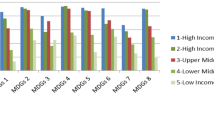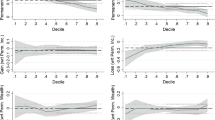Abstract
Gross Domestic Product (GDP) has been utilized by academics and policy makers to indicate the economic well-being of the people. However, economic growth measures cannot capture fully the overall well-being of the people. This paper has tested quality of economic growth in Japan after World War II as to whether it has brought about positive outcome in the well-being of its citizens. Comparison between GDP and GPI (Genuine Progress Index) has revealed that GDP does not fit as well with people’s life satisfaction trend as GPI. Prefecture-based rankings on GDP, Human Development Index (HDI) and Life Satisfaction have shown that there are clear gaps between objective measures and subjective measures to indicate the overall well-being of the people. Also, analysis on major determinants for people’s life satisfaction reveals that older people, women, non-employed people, and those who live in subsidized housings felt satisfied with their life.
Similar content being viewed by others
References
Cobb C., Halstead T. and Rowe J. (1995). The Genuine Progress Indicator: Summary of Data and Methodology. Redefining Progress, San Francisco
Diener E. (1994). Assessing subjective well-being: Progress and opportunities. Social Indicators Research 31: 103–157
(2000). Culture and Subjective Well-Being. MIT-Press, Cambridge, MA
Frey B. and Stutzer A. (2002). Happiness and Economics: How the Economy and Institutions Affect Well-being. Princeton University Press, Princeton, NJ, Oxford
Meadows D.H. (1972). The Limits to Growth: A Report for the Club of Rome’s Project on the Predicament of Mankind. Universe Books, New York
(2005). White Paper on the Labour Economy 2005. MHLW, Tokyo
Nakamura T. (1985). Economic Development of Modern Japan. International Society for Educational Information, Tokyo
Ohashi T., Nakano K., Makino M. and Wada Y. (2003). A Study on Japan’s GPI (Nihon no GPI no keisoku kekka). Future 500, Tokyo
Sen A.K. (1985). Commodities and Capabilities. North-Holland, Amsterdam
Sen A.K. (1999). Development as Freedom. Oxford University Press, Oxford
UNDP: 1990, Human Development Report 1990 (Oxford University Press, Oxford)
UNDP: 2005, Human Development Report 2005 (Oxford University Press, Oxford)
Veenhoven R. (1996). Developments in satisfaction-research. Social Indicators Research 37: 1–46
Author information
Authors and Affiliations
Corresponding author
Rights and permissions
About this article
Cite this article
Kusago, T. Rethinking of Economic Growth and Life Satisfaction in Post-Wwii Japan – A Fresh Approach. Soc Indic Res 81, 79–102 (2007). https://doi.org/10.1007/s11205-006-0016-9
Accepted:
Published:
Issue Date:
DOI: https://doi.org/10.1007/s11205-006-0016-9




